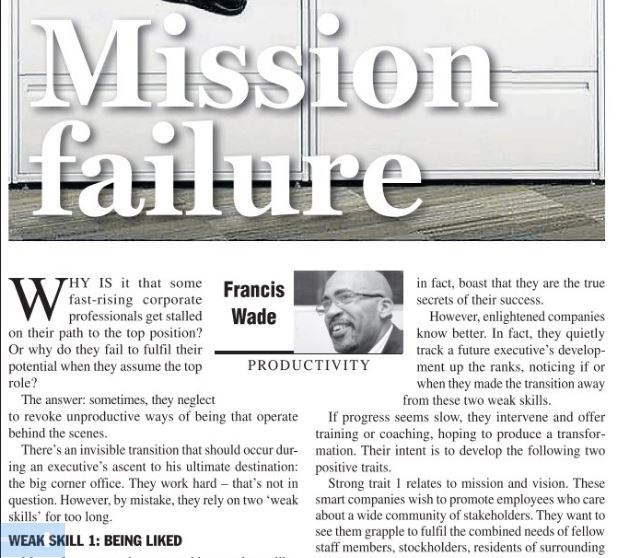Why is it that some fast-rising corporate professionals get stalled on their path to the top position? Or, why do they fail to fulfill their potential when they assume the top role? The answer: sometimes, they neglect to revoke unproductive ways of being that operate behind the scenes.
There’s an invisible transition that should occur during an executive’s ascent to their ultimate destination: the big corner office. They work hard – that’s not in question. However, by mistake, they rely on two weak “skills” for too long.
Weak Skill #1. Being Liked
Most of us want to be managed by people we like. Those who are seeking to be promoted quickly learn that being a nice person who gets along with others is a key skill.
Unfortunately, managing effectively is not the same as running in an election. In the better companies, measurable results are more important than popularity. However, when metrics are hard to come by, likeable people wind up being promoted. It’s only human. In the absence of concrete data “how he/she makes me feel” becomes decisive.
Of course, this can end in disaster. A top executive ends up making decisions that keep his/her likability intact, but are in fact poorly made. By sacrificing results for this lower-level achievement, they put their organization at risk.
Weak Skill #2. Looking Good
The other invisible monster that drives the behavior of would-be executives is that of looking good. It starts in small ways, with the accumulation of tangible goods (house, car, etc.) and the refinement of one’s physical appearance.
Unfortunately, looking good rarely stops there. Eventually, one’s work, team, relationships and other items are added as further objects to defend by the individual’s ego.
The reason this monster grows so fast is that the real driver behind this skill is a fear of looking bad, or rejection. Executives who are wedded to looking good actively try to control anything or anyone who might be associated with their reputation. They go to great lengths to protect their image, even throwing others under the bus. For example, some managers, driven by this fear, will publicly blow up at an innocent mistake made by a subordinate.
On the flip side, these powerful drivers of individual accomplishment help get individuals noticed by those above them in organizational hierarchies. A few will, in fact, boast they are the true secrets of their “success.”
However, enlightened companies know better. In fact, they quietly track a future executive’s development up the ranks, noticing if or when they made the transition away from these two weak skills. If progress seems slow, they intervene and offer training or coaching, hoping to produce a transformation. Their intent is to develop the following two positive traits.
Strong Trait #1 – Mission and Vision
These smart companies wish to promote employees who care about a wide community of stakeholders. They want to see them grapple to fulfill the combined needs of fellow staff members, stockholders, residents of surrounding neighborhoods, customers, suppliers, regulators, and more. Balancing the requirements of all these groups isn’t easy and future CEO’s should begin to struggle with the dilemma long before being promoted. By the time they are elevated, it’s too late.
Strong Trait #2 – Self-Reflection
Few managers realize that the higher they rise in the company, the less quality feedback they will receive. They may get a greater volume of complaints, but the number of people who understand the help they require to be a top executive and are willing to speak up dwindles sharply. As such, they must develop an ability to coach themselves.
This trait is not a matter of second-guessing. Instead, it has to do with a capacity to accept oneself as a work-in-progress. For example, I have met immature executives who would deny that they ever indulge in being liked and looking good. As they read and comprehend these two weak skills, their mind instantly searches for examples which demonstrate where they have transcended both behaviors.
Unfortunately, this rush to exonerate oneself is actual evidence of the ego in action.
The best executives do the opposite, willingly sharing examples of their struggles to overcome being liked and looking good. They realize that the price of leadership is constant vigilance. These two unwanted ways of being are always there, just waiting to cause trouble in new, hard-to-detect forms.
As a result, they engage in self-coaching and self-reflection with a frequency and honesty that can shock others. But it’s not an idle pastime. They willingly sacrifice their ego’s machinations, using this approach as their main method of staying true to their mission: the accomplishment of a lofty vision which serves all related stakeholders.
http://jamaica-gleaner.com/article/business/20200112/francis-wade-mission-failure

